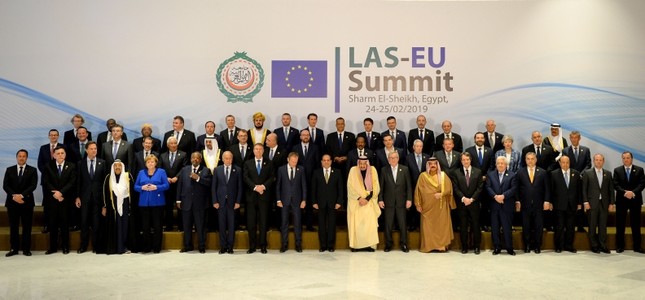In a historic first, the leaders including heads of states and governments of members of the League of Arab States (LAS) and the European Union (EU) held their first-ever summit in Sharm el-Sheikh, Egypt, on 24 and 25 February, 2019. The conference co-chaired by European Council President Donald Tusk and Egyptian President Abdel Fattah Al Sisi was aimed at strengthening Arab-European ties with the stated goal of boosting cooperation on shared challenges and common opportunities such as migration, security, climate change, multiculturalism, trade and investment and establishment of rules-based global order.1
Besides Donald Tusk, the EU delegation was represented by European Commission President Jean-Claude Juncker, European Union Vice President and High Representative of the Union for Foreign Affairs, Federica Mogherini and the Commissioner for European Neighbourhood Policy and Enlargement Negotiations Johannes Hahn. A number of European heads of government such as German Chancellor Angela Merkel, British Prime Minister Theresa May and Austrian Chancellor Sebastian Kurtz were present. In terms of notable absence, French President Emmanuel Macron did not visit and the French delegation was represented by Minister for Europe and Foreign Affairs Jean-Yves Le Drian.
From the Arab side, LAS Secretary-General Ahmed Aboul Gheit, Saudi Arabia’s King Salman Bin Abdulaziz Al Saud, Palestinian Authority (PA) President Mahmoud Abbas, Lebanon’s Prime Minister Saad Hariri, Yemen’s President Abdrabbuh Mansur Hadi and Libya’s Prime Minister from Tripoli-based Government of National Accord (GNA) Fayez Al-Serraj were present in the summit.2 The summit can be seen in the context of US’ disengagement in the region and President Donald Trump’s announcement to reduce the number of troops in Syria. Both organizations are fearful of the resurgence of Islamic State (IS) and the continuation of human migration as a result of the US withdrawal. European states are also concerned about the return of ex-Islamic State fighters to their respective states which could further complicate the precarious security situation. Both organizations, therefore, sought to coordinate its policies and attempt to convince the US to reverse its disengagement policy.3
The subject of migration and terrorism dominated the course of the summit. Migration after the 2011 Arab Spring is a cause of shared concern for both EU and LAS states. The Arab States serve as the point of origin, transit and departure of refugees to Europe. The total number of refugees and migrants that reached Europe was at 225,455 in 2014; 1,032,408 in 2015; 373,652 in 2016; 185,139 in 2017 and 141,475 in 2018. Between 1 January 2019 and 25 February 2019, 8,573 refugees and migrants reached Europe by sea and 2,385 reached by land.4 The refugees, therefore, peaked in 2015 which is at its lowest in 2018. At the same time, the Arab states also host a large number of refugees. Therefore, measures for the protection of refugees within the frontiers of Arab states were discussed.
The summit called for upholding the principles of international human rights law and condemned incitement to hatred, intolerance and xenophobia. Tusk talked about the need for border control; choking the flow of irregular migration as well as developing an effective strategy to halt smuggling and human trafficking which has caused a large number of casualties.5 According to the United Nations High Commission for Refugees (UNHCR), the total number of refugees and migrants that died in the sea to cross over to Europe was at 2277 in 2018 and 3139 in 2017, 5096 in 2016, 3771 in 2015 and 3538 in 2014. In 2019, 207 people are recognized as dead or missing by UNHCR.6
Both sides expressed concerns about threats to international peace and security from terrorism, radicalization, arms trafficking and organized crime and agreed to upgrade cooperation on security, conflict resolution and socio-economic development and develop coordination to address the root causes of terrorism, check the movement of foreign fighters and cut off political, financial, logistical and military support to terrorist networks. They also reiterated their commitment to maintaining the West Asian region free from nuclear weapons and other weapons of mass destruction.
On the question of Palestine, the members present in the summit presented its univocal support for the two-state solution. The participating states shared their common opinion on the status of Jerusalem and agreed that the construction of settlements in the occupied West Bank as illegal. They also agreed to uphold the historic status quo of the holy sites in Jerusalem and expressed its concerns about the political, economic, security and humanitarian situation in Gaza. There was a discussion on reaching a political solution in Syria, Libya and Yemen under the ambit of relevant UN resolutions and stressed on the need to preserve the unity, sovereignty, territorial integrity and independence. The political solution in Syria is rooted in the political transition process by abiding the 2012 Geneva communiqué and complying with UNSC Resolution 2254. They also reaffirmed their support for the 2015 Libyan Political Agreement (LPA) to facilitate a peaceful solution between competing governments and militia groups. Yemeni crisis was also discussed in which the EU delegation urged the conflicting parties to comply with UNSC Resolutions 2216, 2451 and 2452 and welcomed the ceasefire on Hodeidah.7 In the field of trade and investment, EU states are one of the largest trading partner and biggest investor for LAS states. At present, the EU states’ share of oil and natural gas imports from LAS states are at 23 per cent and 19 per cent respectively.8
Moreover, the member states also agreed to develop cooperation in energy, science, research, digital technology, agriculture, fisheries and tourism. The delegates agreed to work towards the 2030 agenda for sustainable development and implementation of the Paris Agreement to tackle climate change. On the subject of Brexit, President Donald Tusk hinted on the possibility of an extension as the deadline for Britain to exit was nearing on 29 March 2019, and assured that the EU would carry out the negotiations with maximum understanding and goodwill.9
Problem Areas
The problems areas in genuine political engagement are rooted in the differences in political systems among the LAS and EU states. The precondition for membership in EU is based on the presence of effective democratic institutions in respective member states, however, the political structure in LAS states ranges from multi-party democracies, semi-democracies to monarchies and dictatorships. The process of policy-making at the national level, international level, organizational level and inter-organizational level are highly diverse which could affect ground level progress on crucial issues such as migration and terrorism.
The internal contradiction in terms of differing positions of the Arab states over regional issues such as migration, security and policy perceptions towards Iran, Middle East Peace Process and conflict in Libya, Syria and Yemen was seen as a hurdle that may hinder cohesion in Arab League’s shared agenda. The implication of the 2017 Gulf crisis was reflected in the absence of any high-level delegation from Qatar. The Arab state was represented by the Permanent Representative of Qatar in LAS Ibrahim Assala. Qatar has been accused of supporting radical groups in Libya and Egypt. Moreover in case of Libya, while France, Italy, Britain and Germany, UAE, Qatar and Saudi Arabia were united in their efforts to topple Muammar Gaddafi, differences have erupted over the present governing body in the country. While Egypt, UAE, Saudi Arabia and France has showcased support for General Khalifa Haftar backed government in Tobruk, Italy, Qatar and Turkey have supported the Tripoli-based government. The common Arab consensus over the issues of terrorism and migration is unlikely to emerge during the summit.
The European states at the same time have failed to frame a coherent policy on migrants over who should take the responsibility and its feasibility which has led to internal divisions within the EU. There were differences over drafting a summit statement earlier this month during the Ministerial level meeting of both regional organizations held on 4 February 2019 when Hungary objected to the section on migration.10 Hungarian Prime Minister Viktor Orban has campaigned to block the refugees and suggested that extremists have entered Europe under the garb of refugees. It has been opposing the EU’s quota system to accommodate refugees and migrants.11
From the EU’s perspective, the summit was also aimed at appealing Egyptian President Abdel Fatah Al Sisi to undertake the responsibility of securing the Libyan coastline by stopping the flow of refugees and economic migrants to Europe. Prior to the summit, the EU’s Border and Coast Guard Agency acknowledged the role played by Egypt to prevent refugees from utilizing the Egyptian coastline since 2016. In return, European states are willing to provide legitimacy to Sisi’s government and overlook the human rights violations within Egypt.12 It has been described as a publicity stunt for the Sisi regime by political analysts to endorse him as a regional leader that has pursued a vigorous campaign to undermine and repress the Muslim Brotherhood members and sympathizers. The hosting of the summit in Egypt was seen as Sisi’s attempts to maintain the LAS as a tool to gain political leverage in the Arab world.
The two-folded agenda for EU in the summit were migration and terrorism. In this context, the EU perceives Arab states as a breeding ground for armed groups and refugees. It, therefore, seeks cooperation from the Arab League member states to halt refugees and terror efforts in Europe. There is an overall understanding about the link between authoritarianism and violence, however, the summit appeared to overlook and in fact empower the activities of the autocratic regimes to consolidate power provided they guarantee to seal the flow of refugees to Europe.
Syria, since 2011, has emerged as a regional battleground for proxy wars prompting a continuous cycle of violence, displacement of six million people and refugee flow to neighbouring Arab states and European states. The absence of Syria from the summit due to its suspension from LAS on 12 November 2011 has also diluted any serious discussion on the issue of refugees and political solution of the crisis.13
To conclude, the dual objectives of the EU to cooperate with LAS states on migration and terrorism are likely to suffer from lack of common consensus in respective forums. EU’s efforts to dump the costs of the regional conflicts and its security and human repercussions on Arab states would not bear fruit as its strategy is focused on the effects rather than addressing the root causes of the problem. At the same time, the Arab states would prefer to solve the shared concerns bilaterally with individual European states rather than a multi-lateral forum which is highly cumbersome. Nevertheless, the motivations to solve the concerns of terrorism and migration would remain a top priority in coming years and the efforts of both organizations to develop a common strategy reflects a geopolitical posture in the context of US’ reducing role in the West Asian region.
Endnotes:
- Council of the European Union. “EU-League of Arab States summit in Sharm El-Sheikh, Egypt, 24-25/02/2019.” February 25, 2019. Accessed February 27, 2019. https://www.consilium.europa.eu/en/meetings/international-summit/2019/02/24-25/
- Council of the European Union. “Participation on EU side.” February 25, 2019. Accessed February 27, 2019. https://www.consilium.europa.eu/media/38268/eulas-summit-list-participants-prelim.pdf
- Nugali, Noor. “EU and Arab League seek common ground at first summit.” Arab News. February 25, 2019. Accessed February 2019. http://www.arabnews.com/node/1457526/middle-east
- UNHCR. “Operational Portal: Refugees Situation.” February 25, 2019. Accessed February 28, 2019. https://data2.unhcr.org/en/situations/mediterranean#_ga=2.21097011.902243149.1551341481-1542845462.1551341481
- Council of the European Union. “Remarks by President Donald Tusk at the press conference after the EU-LAS summit in Egypt.” February 25, 2019. Accessed February 28, 2019. https://www.consilium.europa.eu/en/press/press-releases/2019/02/25/remarks-by-president-donald-tusk-at-the-press-conference-of-the-eu-las-summit-in-egypt/
- UNHCR. “Operational Portal: Refugees Situation.” February 25, 2019. Accessed February 28, 2019. https://data2.unhcr.org/en/situations/mediterranean#_ga=2.21097011.902243149.1551341481-1542845462.1551341481
- Council of the European Union. “Sharm El-Sheikh summit declaration.” February 25, 2019. Accessed February 28, 2019. https://www.consilium.europa.eu/en/press/press-releases/2019/02/25/sharm-el-sheikh-summit-declaration/
- Council of the European Union. “EU - League of Arab States summit Sharm el-Sheikh, Egypt 24-25 February 2019.” February 22, 2019. Accessed February 28, 2019. https://www.consilium.europa.eu/media/38257/eu-las-background-note.pdf
- Euronews. “'Any extension of Article 50 isn't addressing the issues', May says.” Euronews. February 25, 2019. Accessed February 29, 2019. https://www.euronews.com/2019/02/25/watch-any-extension-of-article-50-isn-t-addressing-the-issues-may-says
- Cook, Lorne. “Leaders from EU, Arab League hold first-ever joint summit.” Times of Israel. February 24, 2019. Accessed February 29, 2019. https://www.timesofisrael.com/leaders-from-eu-arab-league-hold-first-ever-joint-summit/
- Al Jazeera. “Hungary to fight EU migrant quotas despite setback.” Al Jazeera. September 8, 2017. Accessed February 28, 2019. https://www.aljazeera.com/news/2017/09/hungary-fight-eu-migrant-quotas-setback-170908153009948.html
- Cook, Lorne. “EU, Arab leaders in first summit focus on security, migrants.” AP News. February 24, 2019. Accessed February 28, 2019.
- Najjar, Farah. “EU-Arab League summit in Egypt is 'insignificant, ceremonial'.” Al Jazeera. February 25, 2019. Accessed February 28, 2019. https://www.aljazeera.com/news/2019/02/eu-arab-league-summit-egypt-insignificant-ceremonial-190224120242905.html
https://www.apnews.com/853a30a92da64798945e49b677b8cf60?utm_campaign=Brookings%20Doha%20Center&utm_source=hs_email&utm_medium=email&utm_content=70190669
(The paper is the author’s individual scholastic articulation. The author certifies that the article/paper is original in content, unpublished and it has not been submitted for publication/web upload elsewhere, and that the facts and figures quoted are duly referenced, as needed, and are believed to be correct).
Image Source:










Post new comment